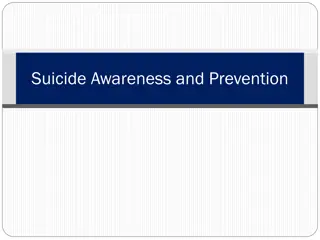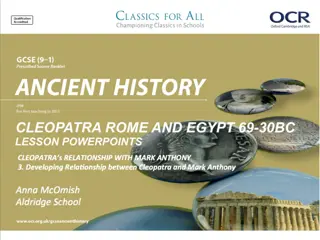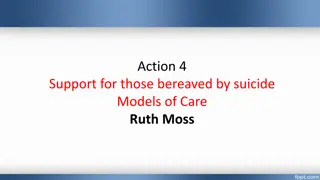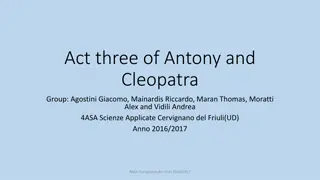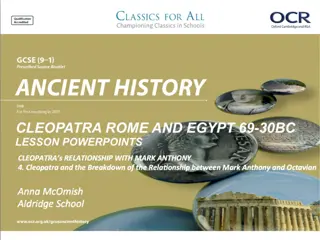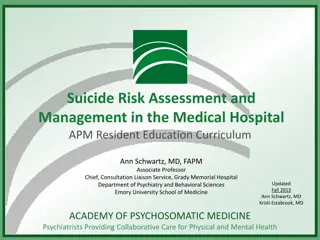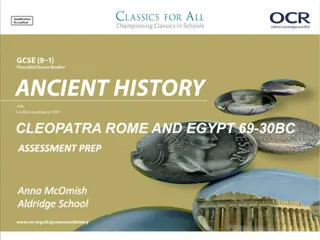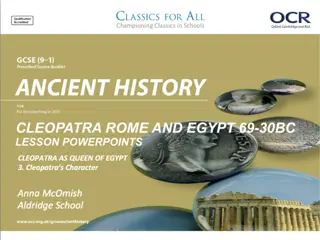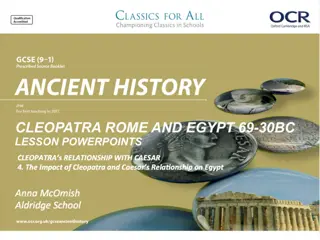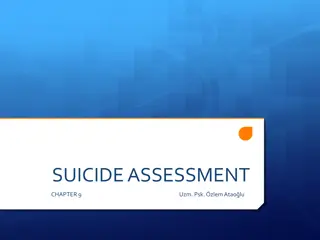The Decision of Cleopatra: Suicide and Roman Accounts
Explore the factors behind Cleopatra's decision to commit suicide and how her death was portrayed in Roman sources. Octavian's arrival in Alexandria, the meeting between Octavian and Cleopatra, and the debate surrounding Cleopatra's method of suicide are discussed, providing insights into the historical events and differing accounts of Cleopatra's death.
Download Presentation

Please find below an Image/Link to download the presentation.
The content on the website is provided AS IS for your information and personal use only. It may not be sold, licensed, or shared on other websites without obtaining consent from the author.If you encounter any issues during the download, it is possible that the publisher has removed the file from their server.
You are allowed to download the files provided on this website for personal or commercial use, subject to the condition that they are used lawfully. All files are the property of their respective owners.
The content on the website is provided AS IS for your information and personal use only. It may not be sold, licensed, or shared on other websites without obtaining consent from the author.
E N D
Presentation Transcript
Cleopatras suicide; methods and reasoning L.O. To understand the factors behind Cleopatra s decision to commit suicide. L.O. to assess the presentation of her death in Roman sources.
Octavian arrives in Alexandria Having followed Antony and Cleopatra s flight from the battle of Actium, Octavian entered Alexandria in great pomp and show. He was very much the successful conqueror. He spoke to the people of Egypt, before he tackled the issue still presented by Cleopatra and her children. This dispelled any myths still present that Cleopatra was in charge and had been successful at Actium Cleopatra had anticipated Octavian s arrival, and had deliberately locked herself (and her treasury!) away in purpose-built mausoleum, so that she could end her life on her own terms. Octavian wanted her alive so she could be paraded through the streets of Rome at a celebratory triumph, in his honour. Cleopatra still presented a range of issues for Octavian; 1. Cleopatra was attempting to kill herself. 2. Cleopatra had barricaded herself away in a secure mausoleum. 3. Cleopatra and Antony s older, male children, Antyllus and Caesarion had come of age and been formally recognised in Egypt. Write out each problem in your book, read p. 202 and Plutarch Life of Mark Antony 79 and 81, and for each problem explain what solution Octavian came up with. CHALLENGE: To what extent do you agree that Cleopatra had become MORE of a threat to Octavian since the battle of Actium?
Joyce Tydesly Dio vs. Plutarch When Octavian met Cleopatra Now that he had finally managed to secure Cleopatra, Octavian met with her to discuss terms, or so Cleopatra hoped. According to Plutarch, Cleopatra was desperate and dishevelled, but still a beautiful queen who blamed Antony for her actions and hoped to gain some favour from Octavian. Octavian was reportedly unmoved by her pleading and charms, but encouraged her to think positively in case she attempted suicide again. Supposedly, Cleopatra resolved to kill herself when she heard that her and her children were set to be paraded through the streets of Rome as part of the triumph after the battle of Actium. This, she could not allow TASK: using p. 202, the photocopy from the Joyce Tydesly book and Dio 51.13; complete the Venn diagram listing the features of Octavian s meeting with Cleopatra that are found only in each text, and then features which are the same for both. Features of Plutarch s account CHALLENGE: Features of Dio s account of the two accounts, which do you believe is the most accurate retelling of the meeting between Octavian and Cleopatra? Explain why using your knowledge of the authors and the history.
Cleopatras death and the Roman response Although all sources agree that Cleopatra chose to take her own life rather than be presented as a defeated queen at Octavian s triumph, there is debate about how exactly she killed herself. Plutarch says that she killed herself with a snake smuggled into her room in a tray of figs, Dio says that the snake arrived in a water jug, or that she killed herself with a poisoned hairpin. CHALLENGE: given that Horace wrote his poetry to celebrate Octavian s victory at Actium and Alexandria, how ACCURATE do you believe his account of Cleopatra s suicide is? TASK: read p.203, Plutarch Life of Mark Antony 85 and Dio, 51.14. 1. Summarise Plutarch version of event in 3 bullet points. 2. Summarise Dio s version of events in 3 bullet points FOCUS ON THE DIFFERENCES FROM PLUTARCH! 3. Read Horace, Ode 1.37 (p. 203). Explain why, even though she was a great adversary of Rome, Cleopatra was given so much respect by the Romans when she died. there are two reasons for this!
In this or in some very similar way she perished, and her two handmaidens with her. As for the eunuch (male servant of Cleopatra), he had allowed himself to be bitten by the snakes at the very time of Cleopatra's arrest, and after being bitten by them had leaped into a coffin already prepared for him. When Caesar heard of Cleopatra's death, he was astounded, and not only viewed her body but also made use of drugs and Psylli in the hope that she might revive But Caesar, when he could not in any way resuscitate Cleopatra, felt both admiration and pity for her, and was excessively grieved on his own account, as if he had been deprived of all the glory of his victory. Cassius Dio, Roman History, 51.14 Using details from the passage, how accurate do you consider Dio saccount of Cleopatra s death to be? (5) FOR GOD S SAKE, GET YOUR BLOODY SOURCES ON CLEOPATRA CHEAT SHEET AND READ ABOUT CASSIUS DIO!!!
Significance of the suicides for Octavian The suicides of Mark Antony and Cleopatra were hugely significant for Octavian, each in their own way. Broadly speaking, Octavian now had unfettered access to power, and the path to total control of Rome was now open to him. As we know, Octavian will go on to become Caesar Augustus, the first Emperor of Rome, and usher in a Golden Age of Roman Emperors. The death of Mark Antony eliminated the last major rival to that power, but the death o Cleopatra gave Octavian access to the financial resources he desperately needed to pay off his soldiers, as well as some much needed good PR! TASK: read p.204 of the textbook, and crate 5 revision flashcards to cover the 5 points of significance for Octavian. On each flashcard, include a small doodle/ illustration to help you remember that point of significance. this is called Dual Coding and is a well- recognised form of revision! CHALLENGE: read Plutarch, Life of Mark Antony, 86. answer the two following questions in full. What can we learn from this source about the death of Cleopatra VII? (5) Using details from the passage, how accurate do you consider Plutarch s account of Cleopatra s death to be? (5)
Make revision materials that help you remember what names are; people, places or cities. 1 TITLE Assessment Follow Up 2 a. 10 marker make sure your points focus on the impact on ROME, as a state/city. 10 marker avoid making hypothetical statements b. TASK: using green pen, rewrite one of your assessment answers, in full, adapting your answer based on the target you have been given. Clearly link back to the question at the end of every paragraph. This shows that 3 a. Ensure that every point you make has a source accompanying it. 4 If your targets only relate to one of the questions, rewrite that question. If you have targets for both questions, be honest with yourself and tackle the question you find the most difficult. a. Use more own knowledge to support your answer to the essay question 5 a. Analyse the accuracy and reliability of each source you reference. I.T - Rewrite a paragraph of your essay, where you analyse a source in a positive way, recognising why it IS reliable. a. Make sure it is clearly explained how your analysis of the source relates back to the point you re making.




